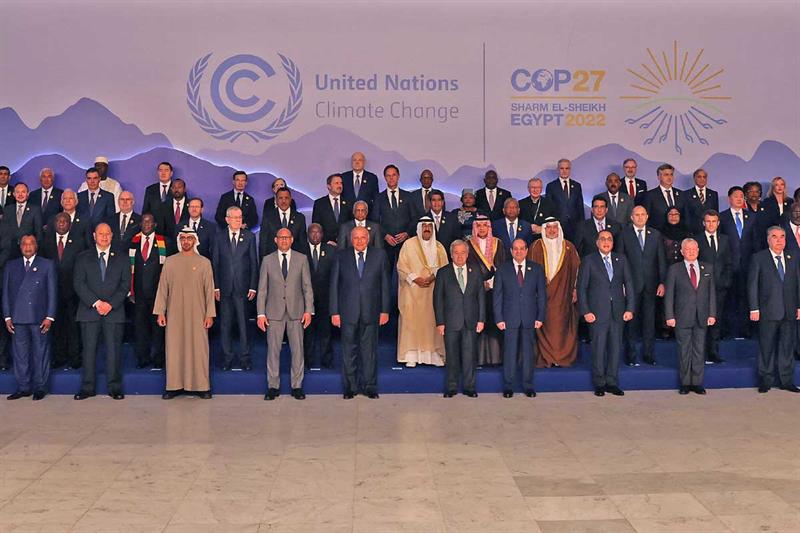Around 200 countries are gathering for the Conference of the Parties (COP27) in Egypt’s Sharm El Sheikh to discuss whether rich and developed nations should pay compensation to other developing countries suffering the adverse impact of climate change.
As per a tweet by the UN summit on Sunday, the loss and damage funding has been officially included as an item in the COP agenda. The delegates of the conference agreed to reach a conclusive decision on loss and damage by 2024, according to a Bloomberg report.
The agenda item, making its appearance at a COP conference for the first time, is titled: “Matters relating to funding arrangements responding to loss and damage associated with the adverse effects of climate change, including a focus on addressing loss and damage,” the report noted.
55 vulnerable countries estimated their combined climate-linked losses over the last two decades amounted to $525 billion, or about 20% of their collective GDP, Reuters said in a report. Some research suggests that by 2030 such losses could reach $580 billion per year.

Climate activists, nongovernmental organizations, and many world governments, from both developed and developing nations, view this as a welcome and essential addition to a conference that risks its reputation as becoming an event where many topics are discussed without any concrete subsequent action made by stakeholders.
“Developing countries have been demanding a discussion on climate reparations since COP meetings started in the early 1990s. But industrialized nations that have prospered for two centuries at the expense of the planet repeatedly blocked efforts to add it to the agenda, fearing it would open demands for billions of dollars in compensation from poorer countries,” said a co-authored Bloomberg report by Johnn Aigner, Salma El Wardany and Jennifer Dlouhy.
Recent climate disasters across several developing nations, such as the floods in Pakistan, have helped to bring this item to the fore of the agenda at the ongoing edition in Sharm El Sheikh.
The inclusion of the climate compensation item “reflects a sense of solidarity and empathy for the suffering of the victims of climate-induced disasters,” said COP27 President Sameh Shoukry.
Cooperation, not compensation
Shoukry relayed that the breakthrough was reached after 48 hours of intense talks concluded with a compromise; the discussion would focus on “cooperation and facilitation” not “liability or compensation,” the report noted.
After the conclusion of the conference, it will be up to developing nations to measure and establish the extent of the environmental damage they have suffered and in turn, how much funding they propose to their developed counterparts to the front to help towards alleviating this burden.
The main opposition to the implementation of a framework surrounding ‘loss and damages’ as discussed has predictably been the USA and EU, who “have resisted the argument fearing spiraling liabilities,” the Reuters report noted.
Since they rejected a similar proposal at last year’s edition in Glasgow, Scotland, these key players in the developed world “have signaled more openness to discuss compensation at COP27 but remain wary of creating a fund.”
“A reasonable sum is more than zero,” Saleemul Huq, a Bangladesh Independent University professor, said in an interview. “Right now, they’re offering zero, which is unacceptable,” the Bloomberg report stated.
Resilient solutions
After wealthy nations failed to deliver on a $100 billion pledge to provide climate finance annually by 2020, many developing countries are exploring various other routes, some of them through the area of international law, others by way of coalitions, as well as those aimed at extracting funding through special taxation schemes on private companies.
The “V20” group of 58 vulnerable countries and the G7’s wealthy nations plan to launch a joint effort named “Global Shield” at COP27, aimed at strengthening insurance and disaster protection finance, according to the Reuters report.
Other climate-vulnerable countries are seeking contributions for a pilot loss and damage funding facility, as they harbor “high expectations” for the creation of a dedicated funding facility to cover loss and damage, UN Climate Change Executive Secretary Simon Stiell was quoted as stating in a Forbes Middle East article in November. “The most vulnerable countries are tired, they are frustrated, [and] the time to have an open and honest discussion on loss and damage is now.”
In a bid to set a workable precedent for the international community to follow, the Pacific island country of Vanuatu, “has asked the world’s highest court – the International Court of Justice – to issue an opinion on the right to be protected from adverse climate impacts. An ICJ opinion could carry moral authority and legal weight, strengthening calls for compensating poor nations.”
Whatever the immediate outcome, most observers ascertain that the inclusion of the ‘loss and damage’ item in headlining the agenda for COP27 is a crucial step in the right direction and one that will bear fruit in the coming years. Even if only some of the proposed solutions are tackled with resolve and resilience by stakeholders from the developed and developing world, the huge task we face on climate change is undeniably a one-world challenge.







